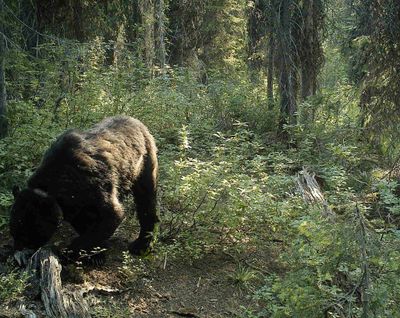Collared bears help create trail of insight

The Inland Northwest is prime bear country – not only for the black bears targeted by hunters, but also for grizzlies, which are a federally protected species.
Hunters must study in advance to distinguish a grizzly bear from a black bear in the field.
National forests in the region have food storage rules that apply to all campers in the effort to prevent bears from being lured into camps.
A grizzly study underway in Idaho has given researchers insight into bear movements.
“They can hang out in one area or get the urge to cover some ground,” Idaho Fish and Game Department regional wildlife manager Wayne Wakkinen said.
A 430-pound male grizzly bear, about 6 years old, was snared, tranquilized and fitted with a GPS collar in the Jackson Creek area northwest of Priest Lake on June 21 by a two-man crew of federal research trappers.
The same grizzly was photographed July 17 by a motion-activated camera Washington Department of Fish and Wildlife biologists had put out in search of wolves in the Bunchgrass Meadows area southeast of Sullivan Lake.
“The bear has since spent much of his time farther south and has ranged from just west of Bismark Meadows into Washington and north as far as Pass Creek Pass,” said Wayne Kasworm, U. S. Fish and Wildlife Service grizzly biologist based in Libby.
The trapping team this summer also captured 10 black bears (seven males, three females) that were ear-tagged and released at the site of capture in North Idaho.
“This is a joint effort with British Columbia. They did some trapping in the Selkirks north of Highway 3 and collared nine grizzly bears (seven males and two females) and we are monitoring those bears.”
Kasworm emphasizes that hunters, hikers and campers should be prepared to encounter a bear in this region.
“Hunters should carry bear spray,” he said. “It’s been proven to be a useful tool that could be more appropriate than trying to use a firearm in certain cases to defend yourself.”
All hunters should be sure of their targets, but bear hunters have a special responsibility.